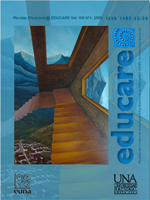Semblanza y liderazgo de Omar Dengo: vigencia de su pensamiento
DOI:
https://doi.org/10.15359/ree.13-1.12Keywords:
education, teaching, leadership, costa rican society, omar dengoAbstract
Aspects of the life of Omar Dengo outline and define him as a figure of outstanding humanistic leadership. His pedagogical work and social commitment are reflected in his actions for civilian causes, which transcend his times and continue to be valid today.References
Bennis, W. (1990). Cómo llegar ser líder. Bogotá, Colombia: Norma.
Bennis, W. & Nanas, B. (1985). Las cuatro claves del liderazgo eficaz. Bogotá, Colombia: Norma.
Cortés, R. (1978). El pensamiento de Omar Dengo en la educación costarricense. En Ferrero, A.,
Rodríguez, C., Sáenz, C., Gamboa, E., Cortés, R. (1978). Omar Dengo visto por cinco de sus
discípulos. San José: Oficina de Publicaciones Universidad de Costa Rica.
Costa Rica. Ministerio de Educación Pública. (1959). Homenaje a Omar Dengo. San José, Costa
Rica: Publicaciones del MEP.
Covey, S. (1997). El liderazgo centrado en principios. Barcelona, España: Paidós.
Chaves, A.; Guillén, C.; Jiménez, L.; Martínez, E.; Sebiani, J. C. & Suárez, J.D. (1988). Filosofía de
la Educación y Omar Dengo. Escuela de Estudios Generales de la Universidad de Costa Rica,
San José, Costa Rica: Publicaciones de la UCR.
Dengo, O. (1961). Omar Dengo: Escritos y discursos. Editora: M. E. Dengo. San José, Costa Rica:
Imprenta Lehmann.
Dengo, O. (2007). Omar Dengo: Escritos y discursos. Editora: M. E. Dengo. Heredia, Costa Rica:
EUNA.
Ferrero, A., Rodríguez, C., Sáenz, C., Gamboa, E. & Cortés, R. (1978). Omar Dengo visto por cinco
de sus discípulos. San José, Costa Rica: Oficina de Publicaciones de la UCR.
Gardner, H. (1998). Mentes líderes. Buenos Aires, Argentina: Paidós.
Gobernabilidad. (2006). Tipos de liderazgo. Recuperado el 10 de mayo, 2006, de http://www.
gobernabilidad.cl/modules.php?name=News&file=article&sid=532
González, M. (1958). Aspectos biográficos y bibliográficos de Omar Dengo. Tesis presentada para
optar por el grado de Licenciado en Filosofía y Letras. San José, Costa Rica.
González, L. (1929). Omar Dengo. Estudio de su personalidad. San José, Costa Rica: Imprenta
Nacional.
Kouzes, J. & Posner, B. (1999). Taller. El desafío del liderazgo. New Jersey, United States: Wiley,
John & Sons.
Monografías.com. (2006) Liderazgo. Recuperado el 15 de mayo, 2006, de http://www.jeanespinosa@
hotmail.com
Mora, S. M. (2003, 23 de noviembre). Omar Dengo, constructor del porvenir. La Nación. p. 8.
Suplemento Áncora.
Salas, J. (1928). Omar Dengo. Repertorio Americano, Vol. 17, 111, 4.
Universidad Nacional. (1961). Selección de escritos de Omar Dengo. Heredia, Costa Rica: Autor.
Downloads
Published
How to Cite
Issue
Section
License
1. In case the submitted paper is accepted for publication, the author(s) FREELY, COSTLESS, EXCLUSIVELY AND FOR AN INDEFINITE TERM transfer copyrights and patrimonial rights to Universidad Nacional (UNA, Costa Rica). For more details check the Originality Statement and Copyright Transfer Agreement
2. REUTILIZATION RIGHTS: UNA authorizes authors to use, for any purpose (among them selfarchiving or autoarchiving) and to publish in the Internet in any electronic site, the paper´'s final version, both approved and published (post print), as long as it is done with a non commercial purpose, does not generate derivates without previous consentment and recognizes both publisher's name and authorship.
3. The submission and possible publication of the paper in the Educare Electronic Journal is ruled by the Journal’s editorial policies, the institutional rules of Universidad Nacional and the laws of the Republic of Costa Rica. Additionally, any possible difference of opinion or future dispute shall be settled in accordance with the mechanisms of Alternative Dispute Resolution and the Costa Rican Jurisdiction.
4. In all cases, it is understood that the opinions issued are those of the authors and do not necessarily reflect the position and opinion of Educare, CIDE or Universidad Nacional, Costa Rica. It is also understood that, in the exercise of academic freedom, the authors have carried out a rogorous scientific-academic process of research, reflection and argumentation thar lays within the thematic scope of interest of the Journal.
5. The papers published by Educare Electronic Journal use a Creative Commons License:















 The articles published by Educare Electronic Journal can be shared with a Creative Commons License:
The articles published by Educare Electronic Journal can be shared with a Creative Commons License: 



